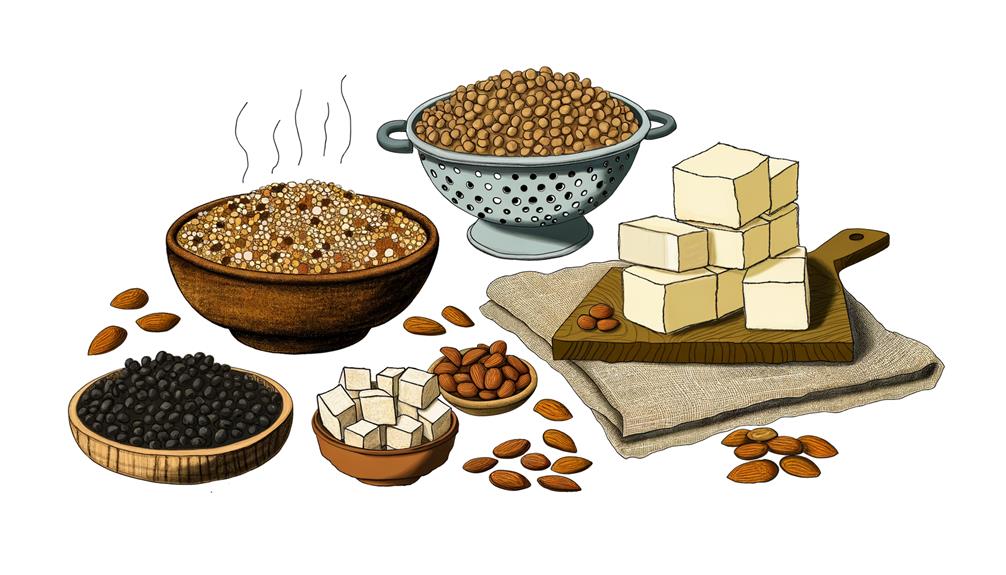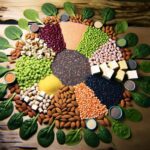Just as Da Vinci found harmony in art and science, you, too, can discover a symphony of nutrition and ethics in the quest for protein sources that align with a cruelty-free lifestyle. You’re here because you understand the impact of your choices, not just on your health, but also on the world around you. Embracing a diet rich in plant-based proteins isn’t merely about personal well-being; it’s a compassionate step towards reducing animal suffering and environmental degradation. While you’ve likely heard of tofu and lentils, there are other treasures in the plant kingdom waiting to nourish you. These sources are not just substitutions but rather standouts in their own right, offering a variety of flavors, textures, and nutrients to support your body’s needs. Stay tuned as we explore these top-tier proteins that promise to enrich your meals without compromising your values or the lives of our fellow beings.
Key Takeaways
- Legumes, such as lentils and beans, are protein powerhouses that offer a complete source of protein when combined with whole grains. They are not only rich in essential nutrients but also support a cruelty-free lifestyle and are kind to the earth.
- Soy-based proteins like tofu and tempeh are complete sources of protein, providing all nine essential amino acids. They are versatile in various recipes and offer numerous health benefits, including supporting energy levels, tissue repair, and overall well-being.
- Alternative protein sources like seitan, nutritional yeast, and spirulina offer high amounts of protein and essential nutrients. They are suitable for a cruelty-free lifestyle and can enhance meals without compromising taste.
- Grains like quinoa and whole grains like brown rice and oats are complete protein sources that can seamlessly replace animal-based protein sources. They are nutritious and align with a kinder, health-conscious lifestyle.
- Nuts and seeds, such as almonds, chia seeds, and pumpkin seeds, provide essential fats and proteins crucial for a heart-healthy, plant-based diet. They are packed with nutrients and support a compassionate lifestyle.
Legumes: A Protein Powerhouse
Dive into the world of legumes, where each cup brims with protein and a spectrum of vital nutrients, supporting your cruelty-free lifestyle with strength and vitality. These plant-based sources of protein are not only kind to the earth but also nourish your body with what it needs to thrive in service to others.
Lentils, for example, are a powerhouse, offering 18 grams of protein per cooked cup. They’re a great source of protein that comes packed with fiber, folate, and iron—essential for maintaining robust health. When you include lentils in your meals, you’re not just choosing compassion; you’re choosing to fuel your body with high amounts of protein and other key nutrients.
Beans, including kidney, black, pinto, and chickpeas, contribute about 15 grams of protein per cooked cup. They’re more than just a staple for a plant-based diet; they’re a cornerstone for a kind and nurturing lifestyle. Alongside protein, these legumes provide complex carbs, fiber, and a treasure trove of beneficial plant compounds.
Embracing legumes means you’re part of a community that values whole grains and legumes, recognizing them as complete protein sources when combined. These foods are rich in essential amino acids, the building blocks of a compassionate, service-oriented life.
Tofu: Versatile and Nutrient-Rich
Step into the culinary versatility of tofu, a plant-derived protein that offers a full spectrum of essential amino acids and 8 grams of protein per 100-gram serving, making it a stellar choice for those committed to a cruelty-free lifestyle. This versatile plant-based protein is made from soybeans, transforming nutrient-rich soy milk into a food that’s high in protein and adaptable to countless recipes.
When you’re exploring plant foods to enrich your protein intake, consider these delightful benefits of tofu:
- Whole Protein: Tofu contains all nine essential amino acids, just like meat, making it a complete, good source of protein for your compassionate diet.
- Iron-Rich: It’s not only high in protein but also a great provider of iron, supporting your energy levels and overall well-being.
- PDCAAS Score: With a PDCAAS score of 1.001, tofu’s protein quality is top-tier, comparable to that of eggs and milk.
- Culinary Chameleon: Whether it’s in stir-fries, soups, or even vegan protein powders, tofu’s texture and taste adapt seamlessly.
- Cruelty-Free: Embrace tofu as your go-to ingredient for a diet that’s kind to all beings, offering peace of mind with every bite.
Your quest for a good source of protein in grams per serving need look no further than tofu, a champion of the plant-based world.
Tempeh: Fermented Protein Source
While tofu offers a smooth entry into plant-based proteins, tempeh presents a textured journey with its own unique benefits as a fermented protein powerhouse. As you embrace tempeh, you’re not just choosing a vegan delight, but a fermented protein source that’s teeming with life-enhancing nutrients. Every bite is an act of kindness towards your body and the planet.
Tempeh, made from whole soybeans, is a celebration of cultural wisdom, harnessing the art of fermentation to unlock a high amount of protein per serving, probiotics, and a wealth of vitamins and minerals. It’s not just food; it’s a tapestry of health, woven with fibers of compassion and sustainability.
Here’s a glimpse into the nutritional profile of tempeh:
| Nutrient | Benefit |
|---|---|
| High Protein | Builds and repairs tissue |
| Iron | Supports blood health |
| Vitamin B12 | Essential for nerve health |
Whether you’re crafting a spicy stir-fry or a hearty sandwich, tempeh’s versatility is a testament to the abundant possibilities of plant protein. It’s a cornerstone for protein sources for vegans, rich in texture and wholesomeness. So, let tempeh grace your table, nourishing you with its robust flavor and the peace of mind that comes from a healthy, cruelty-free choice.
Seitan: Wheat’s Meaty Substitute
Seitan, often hailed as wheat’s answer to meat, offers a protein-packed alternative that transforms plant-based dining with its satisfyingly chewy texture. As you embrace a vegan diet, seitan becomes a cornerstone, providing a high amount of protein per serving. This vital wheat gluten creation mirrors the mouthfeel of meat, making it a beloved choice for those seeking compassionate, protein-rich meals.
Here’s why seitan should be on your radar:
- High Protein Content: With about 25 grams of protein per 3.5 ounces, seitan is a powerhouse source of plant protein.
- Versatile Cooking: It adapts to a multitude of recipes, absorbing flavors and spices beautifully.
- Nutrient-Rich: Besides being a great protein source, it offers nutrients like selenium, iron, calcium, and phosphorus.
- Animal-Free: Enjoying seitan means no animal products are involved, aligning with a lifestyle of kindness.
- Gluten Consideration: While a fantastic protein choice, remember it’s made from gluten, so it’s not suitable for everyone.
Incorporating seitan into your meals contributes to a well-rounded plant protein intake. It’s one of the building blocks for a nourishing, vegan diet that doesn’t compromise on taste or texture. Consider it your go-to when you’re after a meaty bite without the meat.
Quinoa: Complete Protein Grain
Quinoa, often referred to as a ‘supergrain,’ is a complete protein treasure trove, offering all 22 amino acids essential for a cruelty-free, nutritious diet. This excellent source of plant-based protein is a beacon for those who cherish a compassionate lifestyle and wish to nourish their bodies with the best vegan protein sources. Each spoonful of quinoa is laden with the amino acids that the body requires, making it a staple in the realm of vegan-friendly foods that contain a high amount of protein.
As a beneficial plant ally, quinoa doesn’t just stop at protein. It’s also rich in vitamins and minerals, including fiber, manganese, and B vitamins – components that are vital for your overall well-being. Whether you prefer white, red, black, or mixed varieties, these tiny seeds contain an impressive nutritional profile that can seamlessly replace rice or couscous in your meals.
When you choose quinoa, you’re not just opting for a complete protein grain; you’re embracing a food that embodies care for all living beings. Its versatility and dense nutritional value make quinoa an excellent ally in your journey towards a kinder, health-conscious lifestyle.
Nuts and Seeds: Essential Fats and Proteins
Diving into the world of nuts and seeds, you’ll find they’re packed with essential fats and proteins, crucial for maintaining a heart-healthy, plant-based diet. Embracing these gifts from nature not only nourishes your body but also aligns with a compassionate lifestyle, free from animal suffering.
Here’s why nuts and seeds are indispensable in your cruelty-free journey:
- Chia seeds: A tablespoon of chia seeds contain a high amount of protein and are a good source of iron, making them a powerhouse for your meals.
- Hemp seeds: Known for their impressive protein per serving, hemp seeds also offer a wealth of omega-3 fatty acids, vital for brain health.
- Almonds: With their high nutritional value, almonds provide healthy fats and are a delightful crunch in snacks and dishes.
- Walnuts: These brain-shaped nuts aren’t just a coincidence; they’re rich in omega-3s, supporting cognitive function as part of a balanced diet.
- Flaxseeds: A spoonful adds a subtle nuttiness and a boost of fiber, essential for digestive wellness.
When you choose nuts and seeds, you’re not just opting for a high amount of protein; you’re embracing foods that carry life-sustaining nutrients, helping you to serve others with energy and compassion.
Edamame: Young Soybeans Snack
Stepping into the realm of plant-based proteins, you’ll find edamame, a young soybean snack that’s not only rich in nutrients but also kind to the planet and its inhabitants. As someone who yearns to serve others through conscious food choices, you’ll appreciate that these vibrant green pods are a gift of nature, perfectly aligned with a compassionate lifestyle.
Packing a high amount of protein per serving, edamame offers about 12-20 grams per 3.5 ounces, making it a powerhouse for vegetarians and vegans. These vegan foods are high in essential amino acids, the building blocks your body needs to thrive. They’re also abundant in folate and vitamin K, both crucial for maintaining your health.
When you choose edamame, you’re not just selecting a snack; you’re embracing a symbol of cultural adaptation. This young soybean snack blends seamlessly into a variety of dishes, offering versatility to your vegan diet. Its health benefits extend beyond protein, with fiber to support digestion and nutrients like iron and calcium to bolster your immune system.
Embracing vegetarian and vegan sources like edamame means you’re partaking in a global shift towards sustainability and kindness. So, enjoy this cruelty-free snack, knowing you’re nourishing your body and the world.
Lentils: Fiber and Protein Combo
As you explore the bounty of plant-based proteins, consider lentils, a humble legume that pairs fiber and protein in every bite to support your health-conscious, cruelty-free journey. Lentils are more than just a staple in vegan diets; they’re a nutritional powerhouse that can help dispel the myth of a lack of protein in plant-based eating. With a high amount of protein per cup, lentils ensure that you’re getting essential nutrients to fuel your body and mind.
Here’s why you’ll love incorporating lentils into your meals:
- High Protein Content: With 18g of protein per cooked cup, lentils are at the top of vegan protein sources.
- Fiber-Rich: A good amount of fiber supports your digestive health and keeps you feeling full.
- Nutrient-Dense: Packed with folate, manganese, iron, and antioxidants, lentils contribute to overall wellbeing.
- Versatile: From soups to salads, lentils can be transformed into a myriad of delectable dishes.
- Sustainable Choice: Embrace lentils for their affordability and environmental friendliness, aligning with compassionate living.
Chickpeas: For Hummus and Beyond
Venture beyond the beloved hummus to discover the versatility of chickpeas, a plant-based protein that effortlessly enhances your cruelty-free lifestyle. Often known as garbanzo beans, these little legumes are not only the heart of creamy hummus but also a cornerstone in a compassionate kitchen. As you embrace a vegan diet, you’ll find chickpeas to be great sources of not just protein, but also fiber, iron, and essential nutrients.
With about 15 grams of protein and substantial fiber per cooked cup, chickpeas support your nutrition and dietetics needs, making them a main protein contender in a balanced diet. Their role extends into soups, salads, and curries, where they absorb flavors and add satisfying texture. Their rich content of complex carbs and fiber helps manage blood sugar, making them a wise choice for sustained energy.
Moreover, integrating chickpeas into your meals contributes to a kinder world, as they’re harvested without harm to animals. They epitomize the union of taste, health, and compassion. So, let your culinary creativity soar with chickpeas, and nourish both body and soul with every bite.
Nutritional Yeast: Cheesy Protein Boost
Discover the savory secret of vegan cuisine with nutritional yeast, a complete protein that infuses your meals with a nutty, cheesy flavor while packing a nutritious punch. This powerhouse ingredient is not only a high amount of protein but also a beacon of nutrients essential for a thriving vegan diet.
Here’s why you should sprinkle some magic into your dishes:
- Complete Protein: With 8g per half oz serving, nutritional yeast is one of the best sources of complete protein for your plant-based journey.
- Vitamin B12 Fortified**: Many brands of nutritional yeast are fortified with vitamin B12, crucial for energy and red blood cells.
- B Vitamins Galore: It’s a stellar source of vitamin B complex, supporting metabolism and skin health.
- Mineral-Rich: Contains zinc, magnesium, and copper, minerals often sought after in a cruelty-free lifestyle.
- Flavor Booster**: Its cheesy essence can boost your intake of nutritional goodness without compromising on taste.
Whether you’re topping your popcorn or enriching your soups, nutritional yeast is an easy way to elevate your meals. Aim for a sprinkle per day to ensure you’re not missing out on these essentials. Embrace this cheesy delight, and let it nourish both your body and your commitment to compassion.
Spirulina: Protein-Packed Algae
Building on the theme of nutrient-dense, plant-based proteins, let’s explore spirulina, an algae that’s not only rich in complete protein but also brimming with vital minerals and vitamins. Spirulina emerges as a beacon of nourishment, offering a high amount of protein per serving, which makes it an exceptional ally in your journey towards a compassionate, vegan diet.
Spirulina stands out among the great sources of plant-based protein, not just for its higher protein content but also for the wealth of health benefits it encompasses. Its anti-inflammatory and antioxidant properties complement a diet dedicated to serving both your body’s needs and the greater good, without causing harm to other beings.
| Nutrient | Benefit |
|---|---|
| Complete Protein | Supports muscle health and repair |
| Iron | Vital for blood health |
| Copper | Essential for body functions |
| Magnesium | Crucial for nerve and muscle function |
| Essential fatty acids | Important for heart and brain health |
Incorporating spirulina into your meals is a step towards ensuring you get enough protein. Its highly nutritious profile elevates it to one of the highest protein contributors in a cruelty-free diet. Embrace this protein-packed algae and feel confident in the levels of protein you’re providing to yourself and those you serve.
Plant-Based Protein Powders: Convenient Supplement
Plant-based protein powders offer a convenient way to enhance your diet with essential amino acids, especially when time is scarce or you’re on the go. As a vegan or vegetarian, you’re mindful of getting the right nutrients, and these powders are an excellent way to ensure you’re meeting your protein needs.
- Pea Protein: A star in the plant-based protein powders lineup, boasting a high amount of protein per serving.
- Versatility: Easily mix into your smoothies, oatmeal, or even your baking recipes for an extra protein kick.
- Post-Workout Recovery: Ideal for refueling after exercise, supporting muscle repair without the saturated fat and cholesterol found in animal products.
- Macronutrient Balance: Helps you manage your overall macronutrient intake, making it simpler to achieve your health and fitness goals.
- Diverse Choices: With options like rice, hemp, and soy, you can rotate your sources and avoid the risks associated with eating too much protein from a single source.
You’re not just nourishing your body; you’re partaking in a compassionate lifestyle that respects all beings. Plant-based protein powders are more than just a convenient supplement; they’re a testament to your commitment to serving others and the planet with every scoop.
Frequently Asked Questions
What Are the Best Non Animal Sources of Protein?
You’re asking about optimal non-animal protein sources? Consider spirulina wonders, chia power, and the versatility of seitan. Embrace soybean magic, protein-rich grains, and the benefits of legumes, quinoa, hemp hearts, and nutritional yeast.
How Can I Get Protein Without Animals?
You can fuel your body with sustainable protein from plant-based shakes, protein-rich grains, and allergen-free alternatives. Muscle-building legumes boast complete proteins, while nutrient-dense snacks optimize protein absorption and amino acid profiles. Embrace seasonal superfoods.
Where Do Vegans Get the Most Protein?
You’ll find the most protein in tofu’s versatility, seitan benefits, and legume diversity. Embrace protein-packed quinoa, spirulina content, and hemp seeds. Almond nutrition and soy’s versatility fuel plant-based athletes with compassion.
What Are 2 Good Sources of Protein for Vegans?
Seitan’s possibilities and tofu’s soy versatility are your protein powerhouses. They’re like nature’s meat without the guilt, packed with nutrients that serve your body and soul while honoring all living beings.







